Taliban Calls For Restraint, Respect For Civilian Lives in Ukraine
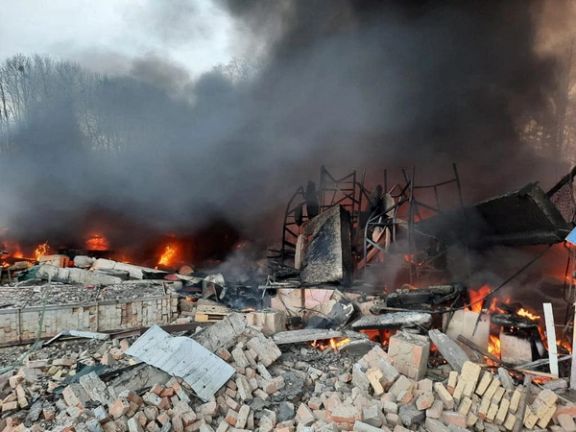
The Taliban has called on Russia and Ukraine to resolve their conflict through peaceful dialogue and expressed concern over civilian casualties.

The Taliban has called on Russia and Ukraine to resolve their conflict through peaceful dialogue and expressed concern over civilian casualties.
Asserting Afghan neutrality Friday, a day after Russian troops invaded Ukraine, a foreign ministry statement called for “all sides…to desist from taking positions that could intensify violence…[and] the possibility of civilian casualties”, and to “pay attention to safeguarding the lives of Afghan students and migrants in Ukraine.”
In its statement, the foreign ministry expressed concern over “the possibility of civilian casualties”, saying that “the Islamic Emirate of Afghanistan is closely monitoring the situation in Ukraine”.
The Taliban were responsible for tens of thousands of civilian casualties in their war against the United States and other Western forces supporting the government, by conducting indiscriminate attacks against schools, hospitals and other civilian targets.
No country has yet recognized the Taliban as Afghanistan's new government since its takeover in August 2021 that reportedly caused thousands of casualties and displaced up to half a million according to UN estimates.
Ukraine's State Migration Service has said that at least 370 Afghans fled violence in Ukraine on evacuation flights last year. According to Ukrainian President Volodymyr Zelenskyy, more than 130 people, including civilians, were killed on Thursday, the first day of the Russian invasion.
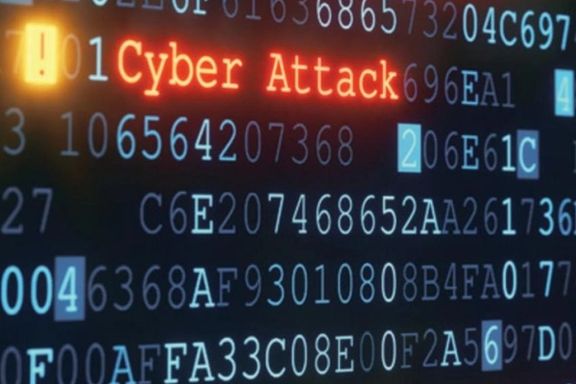
Iran-sponsored cyber espionage group MuddyWater is conducting malicious operations against a range of government and private organizations, a report by US and UK says.
The advanced persistent threat (APT) actors have been active across various sectors, including telecommunications, defense, local government, and oil and natural gas, in Asia, Africa, Europe, and North America since approximately 2018.
The report is the result of cooperation among numerous US and UK security and law enforcement agencies and authorities, such as the FBI, the US Cybersecurity and Infrastructure Security Agency (CISA), and the UK’s National Cyber Security Centre.
MuddyWater -- also known as Earth Vetala, MERCURY, Static Kitten, Seedworm, and TEMP.Zagros – “exploits publicly reported vulnerabilities and uses open-source tools and strategies to gain access to sensitive data on victims’ systems and deploy ransomware” and maintain persistence on victim networks to trick legitimate programs into running malware.
Earlier in January, the US military confirmed that MuddyWater is a subordinate element within Iran's intelligence ministry that steals data from networks around the world, “conducts domestic surveillance to identify regime opponents” and “surveils anti-regime activists abroad through its network of agents placed in Iran’s embassies".
However, a spokesman from the UN mission of the Islamic Republic speaking to Reuters rejected "these baseless allegations and insisted these allegations are part and parcel of the psychological warfare waged against Iran and of no factual or legal value whatsoever”.
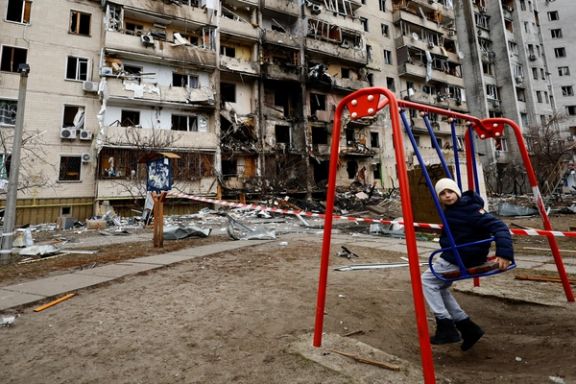
In a phone call with Russia’s President Vladmir Putin Thursday, Iran’s President Ebrahim Raisi called Nato’s “continued expansion” eastwards “a serious threat.”
The phone call, apparently initiated by Raisi, followed Russia's invasion of Ukraine. "The President of Iran expressed understanding with respect to Russia’s security concerns caused by the destabilizing actions of the United States and NATO," a Kremlin press release said Thursday evening.
Putin told Raisi that Russia had taken "a legitimate response" to decades of the “West” violating security agreements and efforts to undermine Russian security, Press TV, Iran's state-run English-language channel, reported.
“The eastward expansion of Nato is a source of tension,” Raisi told Putin. “The continued expansion of Nato is a serious threat against the stability and security of independent countries in various regions of the world.”
Ten eastern European countries have joined Nato, a military alliance, since 1999. With the Ukrainian government wanting to follow suit, Moscow had requested assurances from Nato that Ukraine would not be admitted.
Some Iranian journalists and media have criticized Raisi's call. "What is the justification for Raisi's call to Putin on the first night of Russia's invasion of Ukraine and subtly supporting Russia?" Behrouz Azizi, an Iranian journalist who calls himself a "moderate conservative", tweeted Thursday.
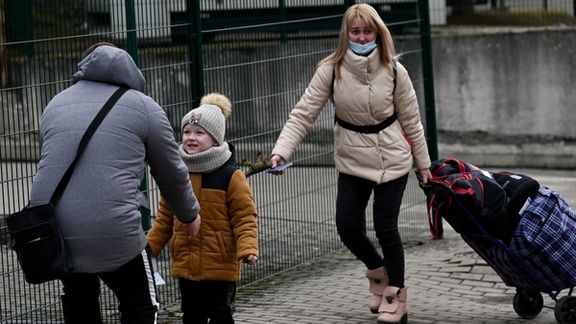
Others have argued that Raisi's views on Nato breach both Iran's official "Neither West, Nor East" mantra and its constitution. "Raisi violated Articles 152 and 154 of the Constitution without any qualms" with his phone call with Putin, Milad Alavi, journalist in Tehran, tweeted Thursday. Article 152 requires “non-alignment with respect to the hegemonist superpowers,” taken at the time to be the United States and the Soviet Union.
Rallying to the Ukrainian cause, journalist Saeed Maleki lashed out at Raisi, tweeting: "You've become so Russophile that you don't even dare to openly condemn the war on Ukraine and the killings. In the phone call all you can do is wishing that these have good consequences…Nothing worse than this could be said."
Russian 'Honeymoon' Won’t Last
Former Iranian ambassador to Baku, Afshar Soleimani, said Iran has not officially approved of Russia's invasion but is standing by Russia's side with "subtle approval." Ali Motahari, a former deputy speaker of parliament, criticized the state media for reporting as if "the mouthpiece of a Russian colony."
Others highlighted Nato’s role.In a series of tweets Friday, Abdollah Ganji, former managing director of Javan newspaper, which is affiliated to the Revolutionary Guards, said Ukraine President Volodymyr Zelenskyy had set the course for war by visiting Nato headquarters last year. Ganji predicted Russia’s "honeymoon in Ukraine" would not last.
The Friday imam of Tehran, Ayatollah Ahmad Khatami, in his sermon Friday said Nato and the US were "meddling all around the world" and "complicating the situation" in eastern Europe as the European Nato powers were "beating on the drums of war."
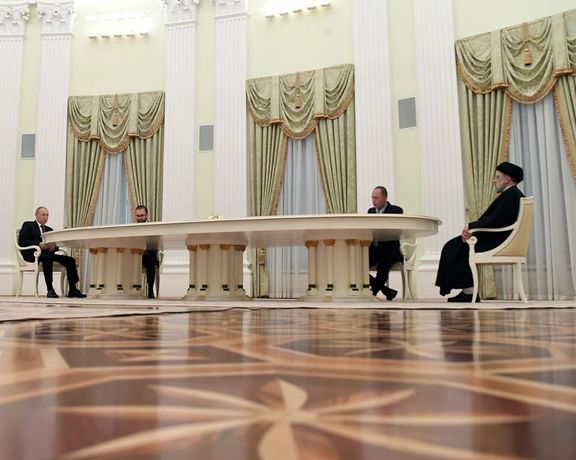
Iranian President Ebrahim Raisi has told Russian President Vladimir Putin in a phone call that NATO's expansion was a "serious threat" to the region's security and stability.
"NATO's expansion eastward creates tension and is a serious threat to the stability and security of independent states in various areas," Raisi was quoted by Iranian media as saying following Russia's military attack on Ukraine on Thursday.
The Iranian foreign minister Hossein Amir-Abdollahian had said earlier that NATO and US are to blame for the Ukraine crisis.
Some in Iranian media and hundreds of social media users criticized the government for statements showing support for Russia in invading Ukraine.
"I hope what is happening will benefit peoples and the entire region," Raisi said as war unfolded and there were reports of dozens of Ukrainian civilians killed by Russian attacks.
Russia is an ally and a diplomatic supporter of the Islamic Republic. The two countries intervened in the Syrian civil war and are believed to be responsible for the deaths of tens of thousands of Syrian civilians.
Russia is also supporting Iran in nuclear talks with the United States as it also plays a mediating role between the Biden Administration and Tehran.

The Russian embassy in Iran has rejected as fake videos published by IRGC-affiliated Tasnim news showing Russian fighter jets in the skies over Ukrainian.
The twitter account of the embassy published a post on Thursday, stating that the videos published by Tasnim with title “Massive presence of the Russian fighter aircrafts and bombers in the Ukrainian sky” is fake and a part of anti-Russian propaganda.
The embassy said that the video is about an aerial parade in Moscow on the occasion of the Victory Day for the Great Patriotic War (1941-1945) and sound is a montage.
It called on the news agency to publish proven information from reliable sources in the future.
Tasnim removed the item from its website and published some other videos showing the explosions and sirens heard in Ukraine.
Tasnim is a website that routinely spreads the propaganda of the Islamic Republic and the IRGC. As the Russian invasion of Ukraine began on Thursday it echoed the official line blaming NATO and US “provocations” for the crisis in Ukraine. The IRGC-linked website apparently published the video to promote pro-Russia propaganda but inadvertently annoyed the Russian embassy.
Earlier in the day, Iran once again reiterated support for Russia in the Ukraine conflict, saying the crisis is rooted in NATO's provocations.
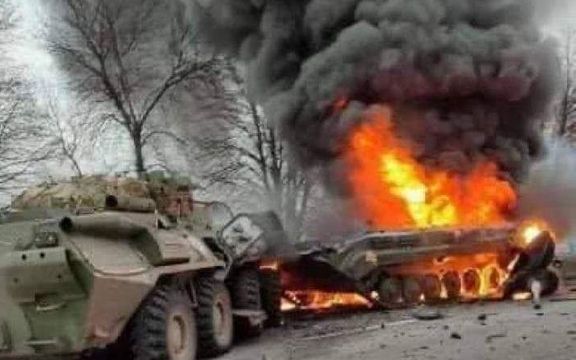
Iran's foreign minister has supported Russia's invasion of Ukraine by casting the blame on NATO and the US, but not everyone in Iran agrees with his position.
"The Ukraine crisis is rooted in NATO's provocations. We don't believe that resorting to war is a solution. Imperative to establish ceasefire and to find a political and democratic resolution," Foreign Minister Hossein Amir-Abdollahian tweeted Thursday.
Mostafa Arani, assistant chief editor of 7Sobh newspaper, in a tweet referred to Amir-Abdollahian's remark saying he avoided mentioning Russia's role in the crisis and only blamed the US and NATO. "Even [Russian Foreign Minister] Sergei Lavrov can't defend Russia as Amir-Abdollahian has done,” he wrote.
Unlike other media outlets, Iran's state broadcaster (IRIB), state-affiliated media such as Fars and Tasnim news agencies, and others associated with hardliners have so far markedly avoided the use of the word "attack" for the Russian invasion. Instead, they refer to the attack as "Russia's special military operations in eastern Ukraine".
The official stance has angered many who find the reporting very biased. Reza Ghobishavi, deputy editor of conservative Asr-e Iran news website, also criticized the media that appear to have sided with Russia and said they had "sacrificed their credibility by siding with Russian President Vladimir Putin".
In a rare incident, Hasan Beheshtipour, a conservative political analyst who often appears on IRIB programs for comments, strongly criticized Russia's invasion of Ukraine and Iran's official stance in a live program. "Invasion whether by the US or Russia is not defensible in any way… Why are you defending Russia? How do you know that Russia will not do the same to Iran some day?" he asked.
"The IRIB is reporting the situation as if it were [the mouthpiece] of a Russian colony," former conservative lawmaker Ali Motahari said in a tweet Thursday.
Motahari also said Iran should condemn the Russian invasion of Ukraine and show its independence. "We must always remember how [Tsarist] Russia took Georgia, Azerbaijan, and Armenia from Iran [in early 19th century] and how the Soviets backed the invasion of Iran by Saddam [Hussein]," he added.
Others have also pointed out Iran's own history with Russia. "We were Russia's neighbors too. They [imposed] the Golestan and Torkmanchay treaties [in the 18th century], occupied Iranian territories during the WWI and WWII, and shelled the Razavi Shrine [in Mashhad]," sociologist Mohammad Fazeli wrote on Twitter. "At least do not give recognition to this military invasion. The logic behind the invasion of Iraq, Afghanistan and Ukraine is the same whether it's by the US or Russia."
Conservative journalist Mohammad Mohajeri in a tweet said he wished his country's foreign minister "had the guts" to condemn Russia's invasion of another country. Mohajeri accused the foreign policy apparatus of lacking "dignity and wisdom" and demanded an explanation of Iran's official stance.
The diplomatic editor of hardliner Tabnak news website, Mostafa Najafi, however, responded to Mohajeri that Iran's condemnation of the invasion would mean taking the West's side. "Why should Iran take the West's side in this matter when it is under their strictest sanctions? It would be best neither to condemn and take the West's side, nor to align ourselves with Russia. What matters is Iran's interests and national security," he argued.
Meanwhile, supporters of former President Mahmoud Ahmadinejad on social media said the current situation is proof of his claim a month ago that Russia and the US had made a "dirty deal" to divide Ukraine and Iran between themselves. "So far half of his prediction proved to be correct," a supporter tweeted.